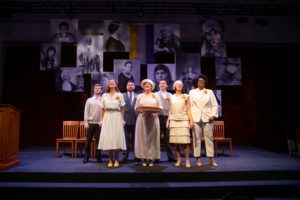
Lyric Opera of Kansas City 2019-20 Review: When There Are Nine
This Celebration’s Power Came From Specific Parts Rather than the Whole
By Hilary Stroh(Credit: Brian Paulette)
Experimentation and adventurous programming are at the heart of The Lyric Opera of Kansas City’s Explorations series. A recent departure for the company, brainchild of General Director and CEO Deborah Sandler, and held in its fine new production facility in the Crossroads district downtown, the series also provides excellent opportunities to showcase the company’s Resident Artists, and allow composers, creative teams, and conductors an intimate space in which to innovate and engage in cultural politics in challenging ways.
The concert, billed “When there are Nine (an allusion to Ruth Bader Ginsburg’s celebrated quip about an all-female Supreme Court),” was an explicit demonstration of the latter.
Rocky Start
The overarching aim was to celebrate the 100th anniversary of the ratification of the Nineteenth Amendment to the U.S. Constitution, giving women the right to vote. As a celebration of an extraordinary historic milestone, perhaps it would be churlish to quibble with the interjection of sentimentality and even kitsch. America the Beautiful was thrown in before the end, for a feel-good straightforward moment of patriotism.
The evening opened, rather coyly, with “Sister Suffragette” from “Mary Poppins,” with white-dressed Anglo suffragists distributing yellow roses to the audience; later “I have Confidence” from “The Sound of Music” made its appearance; the whole concert was brought to a close on “The Impossible Dream” from “Man of La Mancha.” Look, I’m as partial to the classic musicals as anyone else, but there were two problems. First, opera singers don’t quite have Broadway sass, so their versions seem somewhat underwhelming.
Secondly, and perhaps more seriously, what did it all add up to?
The sentimental excerpts from musicals were juxtaposed with serious material and intense questions. Sometimes eclecticism works really well, but here it felt like it spun out of control. Was the concert trying to do too much and in doing so, did it miss a certain purity of focus? Did an Austrian nun running away to be a governess really bring us to the core of the evening, except as a general admonition to believe in yourself? That said, the Von Trapps also had their American dream, but I don’t think there was anything “meta” about this.
In the middle too, texts about education from Malala Yousafzai were given a hearing; again, all very well, in principle, given her contributions to global feminism, but the whole seemed cobbled together and rather too disparate.
On Firmer Ground
Where the concert was on surer, more interesting ground was with Sojourner Truth’s piece. The African-American abolitionist was played by Eboni Fondren; an actor and jazz vocalist, her singing of “The Eagle and Me” had just the husky, gospel-tinged quality that made it come across entirely authentically; the politics of the song were subtle but present.
Also successful were the sour dissonances, the textual crispness, the conversational intensity of Lori Laitman’s songs, their words largely drawn from Susan B Anthony’s writings. (It was precisely these sorts of dissonances that were too “easily” resolved – and therefore not resolved at all – by ending the whole evening with the easy-to-swallow clichés of The Impossible Dream).
Also striking was Jake Heggie’s song about Marian Anderson, sung with great passion by Joseph Leppek. His voice was highly resonant, the articulation clear, the questions he launched as pertinent now as then. “Who are we, beyond compromise, and recrimination, and the anger of a divided nation?”
Most convincing of all, happily, was the core of the evening – the première of Laura Karpman’s song cycle “And Still We Dream.” The libretto Kelley Rourke had forged out of the writings and lives of those two formidable pioneers of the women’s movement, Elizabeth Cady Stanton and Susan B Anthony, close friends and comrades-in-arms.
It was an intensely idiosyncratic 10 minutes, compellingly sung by mezzo-soprano Samantha Gossard, accompanied by the Esterhazy Quartet, and conducted with crisp energy by Carolyn Watson. The angles were fresh, the detail sharply observed, many of the issues involving juggling motherhood and a professional vocation still pertinent, but also an authentic recreation of debates in the early 1900s – about modesty for instance , and sewing (they weren’t fans, to say the least). It was moving to see the whole company and the musicians joined in for the lines “And still we dream,” singing being like politics, in that a collective endeavor transcends individual efforts.
The evening was bravely trying to fulfill lots of functions – primary among them to celebrate something remarkable, and to make the audience feel good about progress (those yellow roses came complete with pins for your lapel). Allowance must be made for positive civic spirit. It’s true I found the depiction of the future in terms of glorious American dreaming all a bit misty-eyed and saccharine, but I’m not sure what else they could have done without challenging their audience into discomfort.
Nonetheless, despite all these restrictions, the evening also set out to do something more artistically ambitious, and in allowing us to “overhear” conversations from yesterday, and compare them to today, it had its successes. Whether one found the overall combination effective or not depends on your point of view. I was not entirely convinced by the whole, but I was intrigued by many of its parts.


